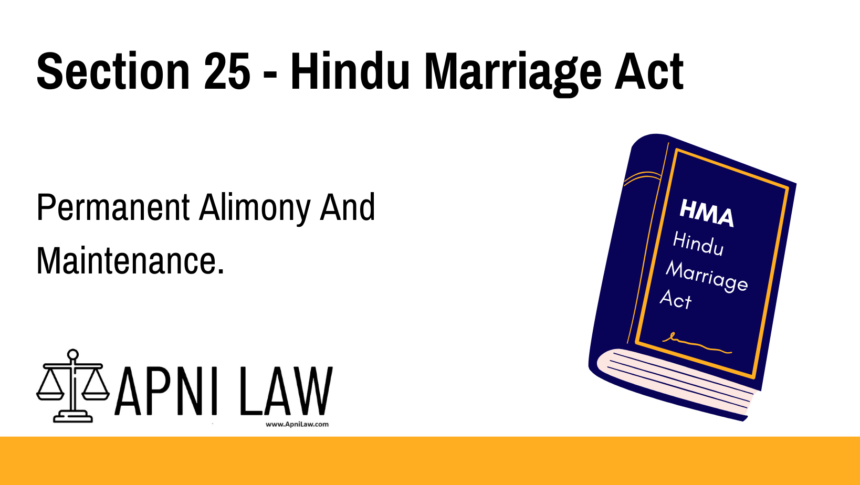Code: Section 25 – Hindu Marriage Act, 1955
❝
(1) Any court exercising jurisdiction under this Act may, at the time of passing any decree or at any time subsequent thereto, on application made to it for the purpose by either the wife or the husband, as the case may be, order that the respondent shall pay to the applicant for her or his maintenance and support such gross sum or such monthly or periodical sum for a term not exceeding the life of the applicant as, having regard to the respondent’s own income and other property, if any, the income and other property of the applicant, the conduct of the parties, and other circumstances of the case, it may seem to the court to be just, and any such payment may be secured, if necessary, by a charge on the immovable property of the respondent.
(2) If the court is satisfied that there is a change in the circumstances of either party at any time after it has made an order under sub-section (1), it may, at the instance of either party, vary, modify or rescind any such order in such manner as the court may deem just.
(3) If the court is satisfied that the party in whose favour an order has been made under this section has re-married or, if such party is the wife, that she has not remained chaste, or, if such party is the husband, that he has had sexual intercourse with any woman outside wedlock, it may at the instance of the other party vary, modify or rescind any such order in such manner as the court may deem just.
❞
Explanation of Section 25 – Hindu Marriage Act
Section 25 of the Hindu Marriage Act provides for the grant of permanent alimony and maintenance to either spouse (husband or wife) after the court passes a decree in a matrimonial case—such as divorce, annulment, or judicial separation. This section recognizes the need for financial support even after a marriage legally ends, ensuring that one party is not left destitute.
Key Provisions:
- Either spouse can apply for maintenance at the time of the decree or later.
- The court considers various factors: income, property, conduct of parties, and overall circumstances.
- Maintenance can be a lump sum or regular monthly payments.
- The court may place a charge on the respondent’s immovable property to ensure payment.
- Orders can be altered or rescinded if there’s a significant change in circumstances.
- If the recipient remarries or is guilty of misconduct (unchastity or adultery), the court may cancel or modify the maintenance order.
Illustration
Example 1: Husband Ordered to Pay Maintenance to Wife
After a divorce decree, the wife applies for permanent alimony under Section 25. The court reviews both parties’ financial positions and orders the husband to pay ₹25,000 per month until her lifetime or until she remarries.
Example 2: Maintenance Rescinded Due to Remarriage
A wife, receiving monthly alimony, gets remarried. The husband applies under Section 25(3) for cancellation of the alimony order. The court revokes the maintenance order since remarriage nullifies her claim.
Example 3: Change in Circumstances
The husband paying monthly maintenance loses his job. He applies under Section 25(2) seeking reduction. The court reduces the maintenance amount after evaluating the changed financial condition.
Common Questions and Answers on Section 25 – Hindu Marriage Act
1. Who can claim permanent alimony under Section 25?
Either the husband or the wife can apply for permanent maintenance after a decree under the Hindu Marriage Act.
2. Can maintenance be given as a lump sum?
Yes. The court may grant a lump sum or periodic (monthly) payments depending on the case.
3. Can maintenance orders be changed later?
Yes. Under Section 25(2), either party may apply to the court to modify, increase, or reduce the maintenance based on changes in circumstances.
4. What happens if the recipient remarries?
Under Section 25(3), the court may cancel the maintenance if the wife remarries or the recipient indulges in misconduct (unchastity or adultery).
5. Is the conduct of the parties considered by the court?
Yes. The court takes into account the behavior and conduct of both parties while determining the maintenance amount.
Conclusion
Section 25 of the Hindu Marriage Act ensures financial justice beyond the conclusion of a marriage. It provides a safety net to the economically weaker spouse, considering income, property, and conduct. The law also incorporates checks to prevent misuse—by allowing courts to alter or cancel maintenance in cases of remarriage or moral misconduct.
Whether you’re applying for or defending against a claim of permanent alimony, understanding your rights and obligations under Section 25 is essential. For expert legal assistance, consult with experienced family lawyers at ApniLaw.








